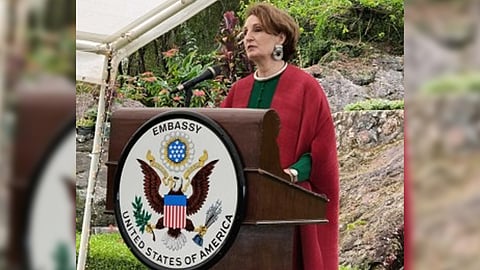
- NEWS
- the EDIT
- COMMENTARY
- BUSINESS
- LIFE
- SHOW
- ACTION
- GLOBAL GOALS
- SNAPS
- DYARYO TIRADA
- MORE

United States Ambassador to the Philippines MaryKay Carlson has expressed her condolences to the family of police Col. Pergentino Malabed Jr., who was among the casualties in the tragic air mishap in Washington, D.C., last week.
Malabed, who was chief of the PNP Supply Management Division, died in a mid-air collision involving a United States Army Black Hawk helicopter and an American Airlines commercial plane near Reagan National Airport in Washington, D.C.
“We mourn the loss of Police Col. Pergentino Malabed, who died in the recent Washington, D.C., plane crash. His service and commitment to upholding peace and security will never be forgotten,” Carlson posted on X (formerly Twitter) on Saturday.
“Our hearts go out to his family and the Philippine National Police colleagues at this time of great loss,” Carlson added.
The Department of Foreign Affairs (DFA) has confirmed the death of Malabed in the tragic air mishap that claimed the lives of 66 others.
In a statement, the DFA also expressed its sincere sympathy to the family of Malabed as well as those who were killed in the incident.
“We express our sincere sympathy and solidarity with the family of all those who died in this terrible tragedy,” the statement read.
Meanwhile, prior to this week’s fatal airplane crash in Washington, the US air traffic control (ATC) system was regarded as an understaffed operation beset with old and sometimes obsolete equipment.
While the investigation into the collision between a regional passenger jet and a military Black Hawk helicopter remains at an early phase, the tragic end to the United States’ 16-year streak of no fatal commercial air crashes promises to keep the ATC’s issues in focus.
A government auditor warned last year the Federal Aviation Administration’s (FAA) troubling record on technology upgrades risked leaving it overwhelmed amid rising demand.
Turning things around “will be the work of many years and billions of dollars,” Kevin Walsh of the Government Accountability Office told a Senate panel.
Longstanding troubles have led to periodic efforts to privatize US air traffic control — something conservatives were positioning for ahead of the second Trump administration.
Michael McCormick, a former FAA control tower manager, noted that privatization campaigns have previously failed because of opposition from established aviation interests.
McCormick credited newer technology with enabling the ATC system to shift from ground- to satellite-based infrastructure, facilitating the ability of controllers to transmit messages directly to planes without using a phone.
The agency’s staffing shortfall is a longstanding problem, McCormick added, due partly to the mandatory retirement age and periodic government shutdowns that have hit recruitment.
These problems worsened during the pandemic, which temporarily halted training.
A shortage of air traffic controllers became a major gripe when airlines began ramping up service amid a surge in travel demand from consumers eager to see the world after Covid-19 lockdowns.
Busy hubs like New York City and Miami now have two-thirds or fewer of the number of needed air traffic controllers.
